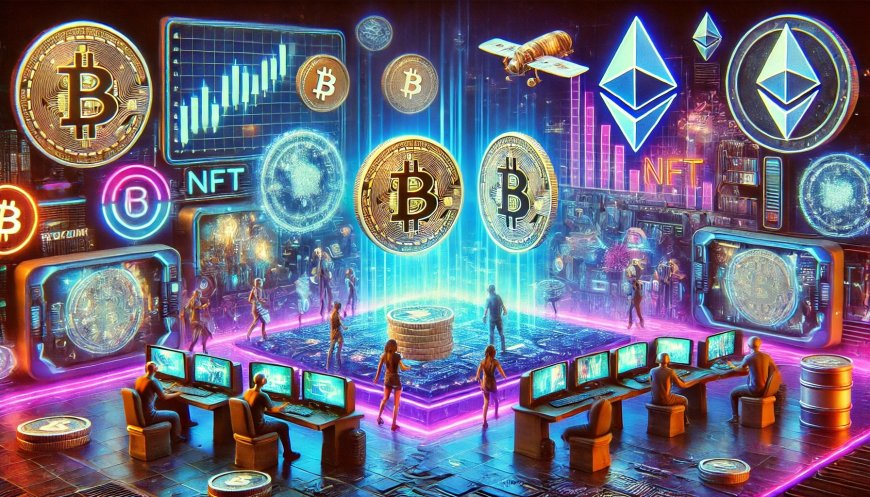How Crypto Tokens Are Enhancing NFT Marketplaces and Gaming
Discover how crypto tokens are enhancing NFT marketplaces and gaming, driving innovation in digital economies and creating new opportunities for creators and players.

The rise of Non-Fungible Tokens (NFTs) has transformed the way we interact with digital art, collectables, and gaming assets. These unique tokens are powered by blockchain technology, providing creators, developers, and players with new ways to monetize and trade digital assets. One key element driving this growth is crypto tokens.
Crypto tokens are digital assets built on blockchain platforms like Ethereum or Binance Smart Chain. They play an essential role in enhancing NFT marketplaces and gaming ecosystems. In this blog post, we’ll explore how crypto tokens are reshaping the NFT and gaming industries, and how crypto token development can help businesses capitalize on these trends.
The Rise of Crypto Tokens in NFT Marketplaces
NFTs have created a booming digital asset market, enabling creators to sell unique digital goods. However, it is crypto tokens that have allowed these assets to be bought, sold, and traded easily across platforms.
Crypto Tokens Power Transactions
NFT marketplaces rely on crypto tokens for buying and selling NFTs. These tokens, often based on popular blockchain networks like Ethereum (ETH), Binance Smart Chain (BSC), or Solana (SOL), serve as the currency for these transactions. Without crypto tokens, NFT marketplaces would not have the liquidity or ease of transaction that they do today.
For example, in Ethereum-based NFT marketplaces like OpenSea or Rarible, ETH is used for purchasing digital art, collectables, or virtual real estate. Crypto tokens provide the necessary medium for transactions and ensure that users can quickly exchange value across borders without the need for traditional financial intermediaries.
NFTs and the Importance of Token Standards
Crypto tokens are also essential in defining the value and ownership of NFTs. NFTs are based on token standards like ERC-721 or ERC-1155, which are protocols on Ethereum’s blockchain. These token standards define the uniqueness and indivisibility of each token.
In an NFT marketplace, creators can mint NFTs using crypto tokens. These tokens represent digital ownership of assets, whether it’s a piece of artwork, a music track, or an in-game item. By using crypto token development to mint NFTs, creators can ensure that their work is scarce and verifiable, making it more valuable to buyers and collectors.
Royalty Payments Through Crypto Tokens
One of the biggest advantages of NFTs is the ability to set royalties. Creators can earn a percentage of the sale price each time their NFT is resold. This is made possible by crypto token development on the blockchain. Smart contracts, which are self-executing contracts written into the blockchain, automatically handle these royalty payments whenever an NFT changes hands.
This is a game-changer for artists and creators who previously relied on intermediaries like galleries or auction houses. Crypto tokens streamline this process, ensuring that creators are compensated fairly every time their work is bought or sold.
Crypto Tokens in Gaming: Revolutionizing Digital Economies
The gaming industry has also seen an incredible transformation thanks to crypto tokens. These tokens power in-game economies, allowing players to earn, trade, and spend digital assets in ways that were not possible in traditional gaming environments.
In-Game Currencies and Tokens
Most online multiplayer games use in-game currencies to facilitate transactions. These currencies are often limited to the game’s ecosystem and cannot be used outside of the game. Crypto tokens, on the other hand, are not confined to one specific platform. They can be used across various games, making them valuable across different virtual worlds.
For example, in games like Axie Infinity and Decentraland, players use crypto tokens to buy virtual land, characters, and items. These tokens can be traded, sold, or used to participate in governance decisions related to the game’s ecosystem. This creates a thriving economy within the game and offers players real-world value for their time and effort.
By integrating crypto token development into gaming platforms, developers can create immersive, decentralized gaming experiences where players have ownership over their assets. These tokens enable a new level of engagement and monetization that traditional gaming models could not offer.
Play-to-Earn and Crypto Tokens
One of the most revolutionary aspects of crypto tokens in gaming is the rise of play-to-earn (P2E) models. In P2E games, players can earn crypto tokens by completing tasks, winning battles, or achieving milestones within the game. These tokens can then be exchanged for real-world money, traded on cryptocurrency exchanges, or used to purchase in-game items.
Games like Axie Infinity, The Sandbox, and Illuvium are leading the charge in the P2E space. Players can earn crypto tokens by breeding creatures, battling other players, or building virtual real estate. This creates a real-world economy within the game, allowing players to profit from their time and effort.
Crypto tokens have made this possible by creating verifiable, transparent systems for tracking ownership and rewarding players. These tokens also allow for seamless trading of in-game assets across different platforms, further fueling the play-to-earn economy.
Tokenized Gaming Assets
Another exciting development is the tokenization of in-game assets. Crypto tokens enable players to own and trade virtual assets like characters, weapons, and land in a decentralized manner. This makes in-game assets more valuable, as they are no longer tied to a single platform or game. Players can now freely trade these assets across multiple games and marketplaces.
For example, in Decentraland, players can buy and sell virtual land using MANA, the native crypto token of the platform. Similarly, in games like Gods Unchained, players can trade collectible cards as NFTs. These tokenized assets are verified on the blockchain, ensuring that ownership is secure and transparent.
Crypto token development allows game developers to create truly unique assets that hold real value, both within the game and in the wider cryptocurrency ecosystem. This provides players with new ways to profit from their in-game efforts and enhances the overall gaming experience.
The Future of Crypto Tokens in NFTs and Gaming
The role of crypto tokens in NFT marketplaces and gaming is only expected to grow. As blockchain technology becomes more scalable and user-friendly, we will likely see even greater adoption of crypto tokens in both industries.
Interoperability Between Games and Marketplaces
One of the key trends in both the NFT and gaming sectors is interoperability. This refers to the ability to use crypto tokens and digital assets across different platforms. For instance, a player might use a crypto token earned in one game to buy NFTs on a marketplace or participate in another game’s economy.
To make this possible, crypto token development must focus on creating tokens that are compatible with various blockchains and platforms. Interoperable tokens will enable players to move seamlessly between different virtual worlds and ecosystems, expanding the value of their digital assets.
Enhanced Virtual Experiences with Crypto Tokens
As virtual and augmented reality (VR and AR) technologies improve, crypto tokens will play a pivotal role in these immersive experiences. Players will be able to interact with virtual worlds in real time, using crypto tokens to purchase virtual goods, participate in events, or earn rewards. The rise of the Metaverse and other virtual environments will further enhance the demand for crypto tokens in gaming and NFTs.
This opens up opportunities for crypto token development companies to create specialized tokens designed for virtual environments. These tokens could be used for everything from purchasing virtual real estate to participating in governance decisions within these virtual worlds.
Conclusion
Crypto tokens have fundamentally transformed both the NFT and gaming industries. They enable seamless transactions, create new revenue streams, and offer players more control over their digital assets. From powering NFT marketplaces to supporting play-to-earn models in gaming, crypto tokens are playing a crucial role in shaping the future of digital economies.
For businesses and developers looking to capitalize on these trends, partnering with a crypto token development company is a smart move. By leveraging crypto tokens, you can build more engaging, profitable, and decentralized ecosystems in the NFT and gaming worlds.
As the industry continues to evolve, crypto tokens will only become more integral to the growth of NFTs and gaming, providing new opportunities for creators, players, and developers alike.
What's Your Reaction?















![Noots Focus Reviews [Truth Exposed 2025]!](https://news.bangboxonline.com/uploads/images/202501/image_430x256_678e3b94881a1.jpg)
![Vivalis Male Enhancement: The Must-Know Ingredients [2025 Update]](https://news.bangboxonline.com/uploads/images/202501/image_430x256_678e3b54e396c.jpg)












